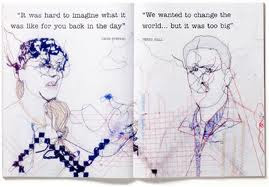THE RVJ
Draw. Work by hand.
Draw. Work by hand.
One
of the most effective ways to express and visualize ideas is drawing them. It
is totally different from working on a computer or camera. The relation and
connection between your eyes and hand help to communicate. The message is easy
and breaks down language barriers. The audience can see the process of
thinking, intention and context of the idea. Pablo Picasso: ,,I begin with an
idea and then it becomes something else’’. Drawing allows reflect ideas, it
doesn’t need to be perfect, it is not for Art. Drawing is thinking – not making
a picture. The purpose is to draw the thoughts, inspirations and explore them
later- make the ideas better and better. Leonardo has developed his ideas by
,,thinking on the page’’, basically drawing them.
Leonardo da Vinci
It
also helps to find the right direction of the idea by asking questions: ,,What
if?’’ ; ,,Why?’’ ; ,,Who is it for?’’ etc. A reflective visual journal is the best way to
keep the record of everything what is on our mind and help to remember ideas.
Drawing is personal analysis, it is a visually organised creative play. It can
be useful to go back to RVJ after some time and develop the ideas. Many
practitioners use that method and truly express the meanings of their ideas
e.g. Danny Gregory or Tommy Kane.
 |
| Danny Gregory |
 | |||
| Tommy Kane |
It is also worthwhile to experiment, to draw with fabric like Lizzie Finn an English illustrator and art director who created unique artwork using a variety of materials.
 |
| Lizzie Finn |
We carry negative thoughts about drawing which might be
misleading. The truth is that drawing helps to free up our self-consciousness. RVJ creates a safe environment to grab
the opportunity and get over ourselves.
Develop Visual Language
Developing visual language
explore the concept that ‘a picture paints a thousand words’ and as importantly
aids understanding of associations or connections of different elements of the
idea. An aid to many aspects of creative thinking, ideas development and even
challenges such as exam revision. The principles of using pictures or visual
language as the primary tool makes learning development and general thinking
easier.
Modern business uses this
approach in many different ways. Mind mapping, or spider diagram as also known,
aid the development of the idea establishing branches of main themes and then
twigs as a smaller detailed extensions of the branch. It enables the individual
to encapsulate the full extent of the thinking onto a single page. We can
explore the work of Tony Buzan on mind mapping to fully understand the
potential of this technique.
The introduction of ‘single
point lessons’ where by a picture would be taken to capture a specific function
or action, developed into a set of pictures to cover an entire process proved
to be an effective tool to improve learning and understanding.
It is highly effective and
efficient way of developing of a concept or idea without the need to create the
continuous prose of text that the mind sometimes neither wants to or is able to
absorb. The end result ‘imprinted’ upon the mind making recollection much
easier and by remembering the connections, branches and twigs, the explanations
and expansion of the idea purposeful.
 |
| Leonardo da Vinci |
 |
| Tony Buzan |
Image source:






No comments:
Post a Comment